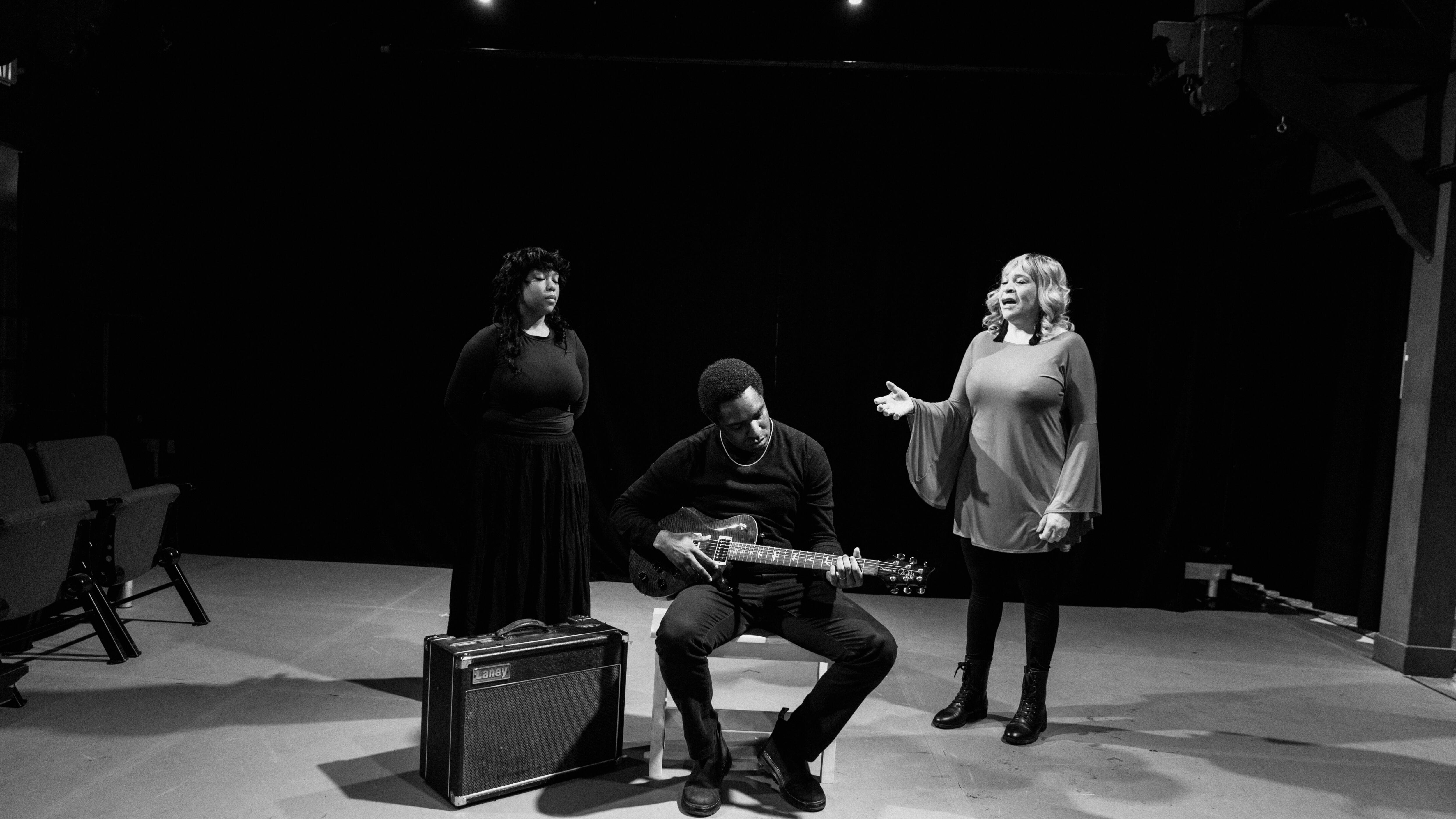Seven years ago, Rodney Hicks’ voice vanished when he needed it most. Starring in the post-9/11 musical Come From Away, he struggled to sing or even speak. His nights were spent onstage in agony; his days were spent with doctors sticking tubes down his throat.
Hicks, 49, was eventually diagnosed with spasmodic dysphonia, a neurological disorder that can affect the voice and speech—the same condition that has plagued Selma Blair and Shania Twain.
“I was told by doctors that I would never speak again, let alone sing, so I’d better find something else to do,” Hicks says. “I’d always written recreationally—in the closet, I like to say. And I was a closet director.”
Hicks’ next act promises to be one hell of a coming-out party. In April, Portland Playhouse will open his revisionist production of his favorite musical: Passing Strange, the story of a young Black musician’s journey from Los Angeles to Amsterdam and Berlin.
“We’re really bending what this show can be,” says Hicks, who has regained the use of his voice and has continued to act. “It will not be anybody’s version of Passing Strange—I guarantee you. And I don’t mean that in a cocky way. I mean that I’m a big old theater queen.”
Conceived and composed by playwright-songwriter Stew in 2006, Passing Strange follows a man simply named Youth (Charles Grant) as he travels the globe, defying his mother (LaRhonda Steele) and defining himself through rock ‘n’ roll. The play has attracted an ardent following that includes Spike Lee, who filmed a performance in 2009.
Hicks first saw Passing Strange in 2007, back when he was playing Benjamin Coffin III in Rent on Broadway. He spent his days off losing himself in the original production of Stew’s coming-of-age saga, which featured Rustin Oscar nominee Colman Domingo (whom Hicks counts as a friend).
“What Stew has said about his show is, ‘We made this up as we went along. So, you do improv too,’” Hicks says. “Meaning, do your own vision. Don’t try to copy.”
Hicks’ vision came to fruition in the wake of tragedy: Shirley Jo Finney, the original director of Portland Playhouse’s production of Passing Strange, died from cancer. While Hicks resides in Denver—he lived in Portland from 2012 to 2017—he accepted the offer to succeed Finney, determined to revitalize and revamp Passing Strange.
That meant injecting the play with a force that had been missing from the original script: what Hicks describes as “feminine energy.”
“Reading it now almost 17 years later, I thought, gosh, Youth is such a jerk to his mother,” Hicks says. “I kept thinking, what turns people against their loved ones? Grief and healing kept coming up.”
Under Hicks’ direction, the play underwent notable changes that shifted the tone. Originally focused on the 1970s and ‘80s, the story now begins with a funeral in 2024 (the identity of the deceased is a mystery) and features a nonbinary character and a female narrator (Jasonica Moore).
Hicks is also supervising the addition of daring visual flourishes, including the transition from grayscale sets and costumes for the play’s U.S.-set scenes to a more vibrant palette once Youth lands in Europe—plus a stage floor painted to look like the sky.
“We’re just really tricking the entire theater out,” Hicks says. “When you walk in, you’re in another time and space. We’re playing with a whole in-between—not here on earth, not yet in heaven. The narrative of Stew is almost an archangel type [of story].”
A similar sense of displacement struck Hicks when he was diagnosed with spasmodic dysphonia. Refusing to accept that his singing and speaking days were over, he committed to a regimen of vocal exercises, as well as botox injections to his throat. On the morning his father died, Hicks finally regained the use of his voice; by Hicks’ birthday in 2018, he could sing “Amazing Grace.”
“I wake up every day with two words: thank you,” Hicks says. “And I am grateful because gratitude will get you through your entire life. Youth comes to learn that by the end of the show. He learns about gratitude, he learns about grace, he learns about empathy. But he has to go through all of it to learn his lesson.”
Hicks has much to be grateful for. After being closeted half of his life (“I believe the closet kills,” he says), he’s married to Chris Coleman, former artistic director of Portland Center Stage. He is also pursuing projects not only in theater, but in film and television.
For now, however, Hicks is focused on upholding and transcending the ideals of Passing Strange.
“Passing Strange, it just made sense to me,” he says. “We can actually create a vision for this—and therefore, we can then invite others along with this vision, and we can build on it together.”
SEE IT: Passing Strange plays at Portland Playhouse, 602 NE Prescott St., 503-488-5822, portlandplayhouse.org. 7:30 pm Wednesday-Saturday and 2 pm Sunday, April 17-May 26. $5-$59.95.
